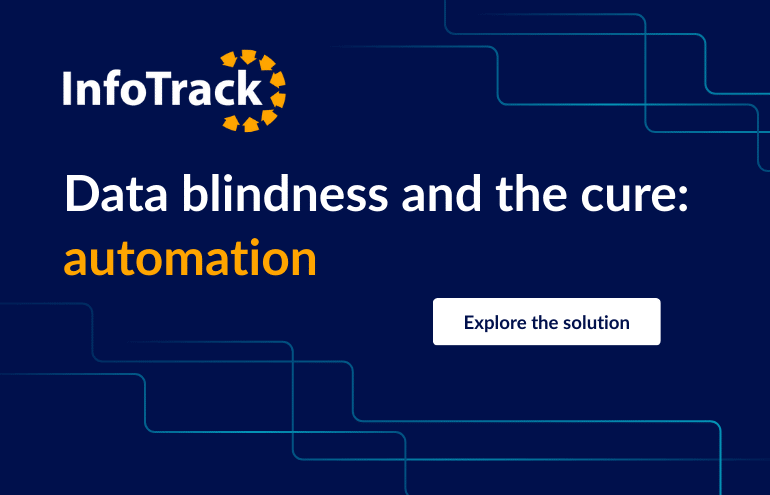Data blindness causes high eFiling rejection rates. Learn how legal automation cures this cognitive problem, reduces clerical errors by half, and protects your firm from costly mistakes.

Table of contents
- What is Data Blindness?
- Why it Matters in Legal Support
- You May Not Be Able to Out-Focus the Problem, But You Can Outsmart it
- InfoTrack Intelligence: A Smarter Way to eFile
- Buying Back Your Peace of Mind
- The Big Picture For Law Firms: A Strategic Investment in Legal Automation
- Final Thoughts: The Future is Attentive
When you work in litigation — especially in legal support — your day often revolves around data and details. You spend a big chunk of your work time reviewing legal filings, transcribing details, and entering case data into court systems with precision.
To outsiders, those tasks sound simple.
But you know the stakes are high: one wrong date, one mistyped case number, and a filing gets rejected. Mix-ups with email addresses can expose private information to the wrong people. Some mistakes can even put you at risk of malpractice claims.
The root cause of many of those mistakes isn’t negligence or carelessness, but data blindness.
Turns out, it’s a phenomenon that’s frustratingly common, surprisingly scientific, and, thanks to legal automation, completely solvable.
Spoiler…There are tools that can help.
What is Data Blindness?
Data blindness, sometimes referred to as repetition blindness or inattentional blindness, occurs when your brain starts filtering out repetitive information in an effort to preserve mental energy.
The more often you see the same or similar details — say, the parties’ names, the case number, or a court address repeated across multiple documents — the less likely your brain is to notice small discrepancies or typos.
In other words: the more familiar the data, the easier it is to miss mistakes.
This isn’t just speculation. It’s cognitive science. Researchers have found that when we see repeated information in rapid succession, our brains will often “skip” over what feels redundant.
In fact, memory and cognition experts have known since at least 1989 that repetition blindness can cause readers to miss duplicate words or incorrect phrasing, especially when they expect to see something else.
Another study echoed this, noting that our minds tend to fill in the gaps based on context rather than what’s actually on the page.
In high-pressure environments like law firms, cognitive overload compounds the problem.
Indeed, according to The Behavioral Scientist, repetition blindness is often exacerbated when your attentional resources are tapped out by things like fatigue or information overload.
Articles published by the National Institute of Health support this, noting that attentional fatigue leads to “inattentional blindness,” i.e., missing information that’s in plain sight because your brain is simply too taxed to process it.
Why it Matters in Legal Support
If you’ve ever re-keyed the same information from a legal document into an eFiling system, you’ve likely been hit by data blindness. You look at the complaint, spot the party names, enter them into the platform…and miss that an “Inc.” was omitted or a birthdate was reversed.
It happens in seconds, you don’t catch the error until the court kicks the filing back.
According to internal data we’ve compiled at InfoTrack, 47% of eFiling rejections stem from these kinds of clerical mistakes — typos, mismatched fields, or skipped items.
That means nearly half of all rejections can be traced back to discrepancies that our brains are hardwired to overlook.
If you’re in legal support, you know exactly what this is like.
You’re juggling multiple cases, demanding partners, client emails, and communication across teams, often without time to double-check your work. And when a rejection hits, you’re the one scrambling to fix it — still under pressure, still on a deadline, and now with a frustrated boss waiting for answers.
You May Not Be Able to Out-Focus the Problem, But You Can Outsmart it
Here’s the hard truth:
No amount of coffee or extra effort can fully overcome the brain’s tendency toward data blindness.
The real solution isn’t trying harder. It’s changing the process through legal workflow.
When you automate the most tedious parts of your job, you do two very important things:
First, you can rely on legal automation to copy information exactly the same every time. If it’s right in your source of truth, it will be right everywhere else that draws from that information.
Automation tools don’t get tired. They don’t skip over typos or make assumptions based on context. They process data exactly as it’s presented, with none of the cognitive baggage humans carry.
Second, it gives you back some of your mental energy.
Whether we want to admit it or not, we all have a limit to the amount of alert, focused work we can do without resting. Boring and repetitive jobs add a lot to your mental load, and that takes capacity away from everything else.
Think of it this way:
If your job is to spot and prevent small errors, automation in the legal field acts like a highly alert second set of eyes. It handles the repetitive parts so your brain can focus on what really matters.
InfoTrack Intelligence: A Smarter Way to eFile
Enter InfoTrack Intelligence, a new automation upgrade built specifically to address data blindness in the legal filing process.
Here’s how the process works:
- You select your legal documents.
- InfoTrack Intelligence reads those documents and autofills 95% or more of the required fields with 99%+ accuracy.
- You review, hit submit, and you’re done.
Your entire eFiling takes less than 30 seconds.
The results speak for themselves. Early adopters have already reported that eFiling rejection rates dropped by half after using InfoTrack Intelligence. That’s a massive time saver and a big mental relief for legal professionals on the frontlines.
Buying Back Your Peace of Mind
Reducing errors is important, but there’s a deeper benefit here, too: clarity.
When automation lightens your cognitive load, you become better at everything else:
- You catch more subtle issues in client files
- You communicate more clearly with your team
- You feel less overwhelmed at the end of the day
We all know the day-to-day reality of your work: legal professionals are stretched thin. Consequently, the ability to redirect your attention away from data entry and toward high-value work isn’t just a win — it’s a necessity.
As legal technology continues to advance, tools like InfoTrack Intelligence show what’s possible when we stop expecting humans to act like machines.
The secret is leveraging machines to support human strengths.
The Big Picture For Law Firms: A Strategic Investment in Legal Automation
While legal support staff are the most directly impacted by data blindness, firm leadership should take note as well.
Every rejection costs time.
Every correction pulls support staff away from other priorities.
Over time, these inefficiencies add up in billable hours, and also in burnout, turnover, and client dissatisfaction.
Adopting legal automation is a strategic investment in accuracy, morale, and client service.
Firms that use technology wisely to support the litigation workflow have a strategic advantage. They also have happier employees and clients.
Final Thoughts: The Future is Attentive
Data blindness is invisible until it isn’t.
One missed field. One wrong digit. One rejected filing that throws off your whole week.
But it’s not inevitable.
By understanding how our brains work and embracing legal automation, we can build workflows that are smarter, calmer, and far more effective.
Learn more about InfoTrack Intelligence and how it addresses the challenges of data blindness when eFiling and serving.

SPONSORED CONTENT. Product Spotlight showcases content provided by Attorney at Work sponsors and advertisers. This does not constitute endorsement by Attorney at Work. See Terms and Conditions for more information.















